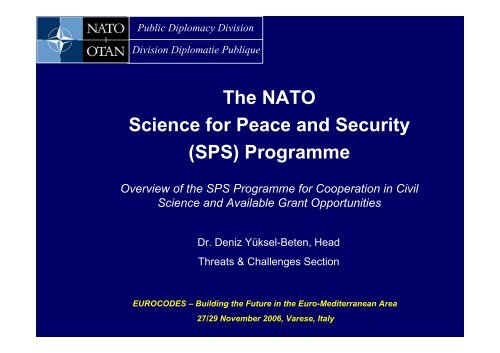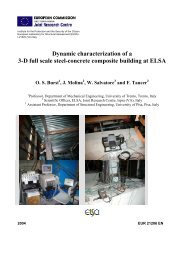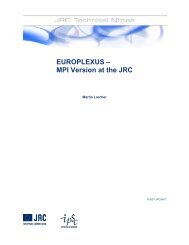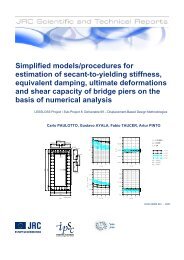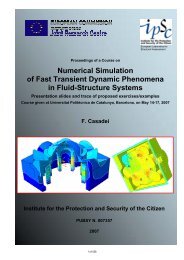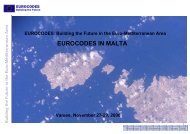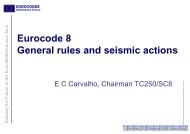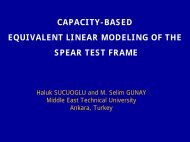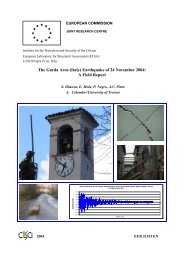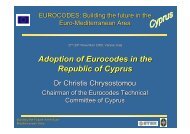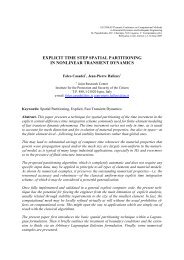The NATO Science for Peace and Security (SPS) Programme - ELSA
The NATO Science for Peace and Security (SPS) Programme - ELSA
The NATO Science for Peace and Security (SPS) Programme - ELSA
- No tags were found...
Create successful ePaper yourself
Turn your PDF publications into a flip-book with our unique Google optimized e-Paper software.
Public Diplomacy DivisionDivision Diplomatie Publique<strong>The</strong> <strong>NATO</strong><strong>Science</strong> <strong>for</strong> <strong>Peace</strong> <strong>and</strong> <strong>Security</strong>(<strong>SPS</strong>) <strong>Programme</strong>Overview of the <strong>SPS</strong> <strong>Programme</strong> <strong>for</strong> Cooperation in Civil<strong>Science</strong> <strong>and</strong> Available Grant OpportunitiesDr. Deniz Yüksel-Beten, HeadThreats & Challenges SectionEUROCODES – Building the Future in the Euro-Mediterranean Area27/29 November 2006, Varese, Italy
Public Diplomacy DivisionDivision Diplomatie Publique<strong>SPS</strong>Outline• <strong>The</strong> new <strong>SPS</strong> Committee <strong>and</strong> <strong>Programme</strong>• Objectives of <strong>Science</strong> <strong>for</strong> <strong>Peace</strong> <strong>and</strong> <strong>Security</strong>• A Unique Network of Cooperation• Priority Research Topics• <strong>NATO</strong>’s priorities• Partner priorities• Target Participants & Mechanisms• Organization• 4 Panels• How to Apply
Public Diplomacy DivisionDivision Diplomatie Publique<strong>The</strong> New <strong>SPS</strong>Committee• <strong>The</strong> new <strong>SPS</strong> Committee <strong>and</strong> <strong>Programme</strong> wasestablished by the <strong>NATO</strong> Council on 28 June 2006• Primary <strong>NATO</strong> body over a programme <strong>for</strong>enhancing cooperation with all partnershipsbased on science <strong>and</strong> innovation• Conducts activities aligned with <strong>NATO</strong>’s StrategicObjectives – especially Partnership• To have a ‘horizon-scanning’ role in identifying futurethreats, raising awareness <strong>and</strong> finding solutions
Public Diplomacy DivisionDivision Diplomatie Publique<strong>SPS</strong> ObjectivesEstablish concrete civil collaboration between <strong>NATO</strong>countries, Partner <strong>and</strong> Med Dialogue countriesMobilize <strong>and</strong> enhance R & D capabilities in:• <strong>NATO</strong> priorities• Partner country prioritiesContribute to solving problems effecting large societies inPartner <strong>and</strong> Med Dialogue countriesPromote <strong>NATO</strong>’s values in targeted communities inPartner <strong>and</strong> Med Dialogue countries <strong>and</strong> society at large• Young generation of ‘Leaders of Tomorrow’Contribute to Stability <strong>and</strong> <strong>Peace</strong> e.g. by promotingregional co-operation4
Public Diplomacy DivisionDivision Diplomatie PubliqueA Unique Network ofCooperation<strong>NATO</strong> CountriesBelgium, Bulgaria, Canada, Czech Republic, Denmark, Estonia, France,Germany, Greece, Hungary, Icel<strong>and</strong>, Italy, Latvia, Lithuania, Luxembourg,Netherl<strong>and</strong>s, Norway, Pol<strong>and</strong>, Portugal, Romania, Slovakia, Slovenia, Spain,Turkey, United Kingdom, United StatesPartner CountriesRussia, Ukraine, Belarus, Moldova, the <strong>for</strong>mer Yugoslav Republic ofMacedonia(*), Finl<strong>and</strong>, Sweden, Irel<strong>and</strong>, Austria, Switzerl<strong>and</strong>, Croatia, Albania,Georgia, Azerbaijan, Armenia, Kyrgyz Republic, Kazakhstan, Turkmenistan,Uzbekistan, TajikistanMediterranean Dialogue CountriesAlgeria, Egypt, Israel, Jordan, Mauritania, Morocco, TunisiaTotal: 53 countries(*) Turkey recognizes the Republic of Macedonia with its constitutional name
Public Diplomacy DivisionDivision Diplomatie Publique<strong>SPS</strong> Characteristics• <strong>Programme</strong> elements• Nationally Funded Activities• <strong>NATO</strong> Managed Activities• <strong>NATO</strong> Initiated Activities• Solicited Proposals from Experts• All applications: <strong>NATO</strong> + Partner / MD signatures• Rapid approval <strong>for</strong> activities / low bureaucracy• Non-military, civil science• Variety of mechanisms• Special arrangement <strong>for</strong> <strong>NATO</strong>-Russia cooperation• NRC <strong>SPS</strong> Committee under the <strong>NATO</strong>-Russia Council• In addition to Russian participation in the Partnershiparrangement• Based on Key Priorities (<strong>NATO</strong> <strong>and</strong> Partner Country priorities)6
Public Diplomacy DivisionDivision Diplomatie PubliqueKey Priorities (1)• Defence Against Terrorism• Rapid Detection of CBRN Agents <strong>and</strong> Weapons, <strong>and</strong> RapidDiagnosis of their effects on people• Novel <strong>and</strong> rapid methods of detection• Physical Protection against CBRN agents• Decontamination of CBRN agents• Destruction of CBRN agents <strong>and</strong> weapons (e.g., chemical<strong>and</strong> vaccine technologies)• Medical Countermeasures• Explosive Detection• Food <strong>Security</strong>• In<strong>for</strong>mation <strong>Security</strong>• Eco-Terrorism Countermeasures• Computer Terrorism Countermeasures7
Public Diplomacy DivisionDivision Diplomatie PubliqueKey Priorities (2)• Scientific Collaboration to Counter Other Threats to <strong>Security</strong>• Environmental <strong>Security</strong> (e.g., desertification, l<strong>and</strong> erosion,pollution, etc.)• Water Resources Management• Management of Non-Renewable Resources• Modelling Sustainable Consumption (e.g., food, energy,materials, fiscal measures <strong>and</strong> environmental costing)• Disaster Forecast <strong>and</strong> Prevention• Human <strong>and</strong> Societal Dynamics (e.g. new challenges <strong>for</strong> globalsecurity, economic impact of terrorist actions, risk studies,topics in science policy)8
Public Diplomacy DivisionDivision Diplomatie PubliqueKey Priorities (3)• Partner Country Priorities• Specific topics <strong>for</strong> collaborative research havebeen identified by the Partner countries• High priorities <strong>for</strong> individual Partner countries• Some common themes:• Environmental <strong>Security</strong>• Computer Networking• Counter-Terrorism• Posted on the <strong>SPS</strong> website along with the otherpriority areas:• www.nato.int/science.9
Public Diplomacy DivisionDivision Diplomatie PubliqueSupport MechanismsCOLLABORATIVE LINKAGE GRANTS (CLGs)To pool ideas <strong>and</strong> resources on researchprojects, <strong>and</strong> create specialist network10
Public Diplomacy DivisionDivision Diplomatie PubliqueSupport MechanismsADVANCED STUDY INSTITUTES(ASI)Grants to organise high-level tutorial courses toconvey the latest developments in a subject toan advanced-level audience11
Public Diplomacy DivisionDivision Diplomatie PubliqueSupport MechanismsADVANCED RESEARCH WORKSHOPS(ARW)Grants to organise expert workshops where anintense but in<strong>for</strong>mal exchange of views at thefrontiers of a subject aims at identifying directions<strong>for</strong> future actions12
Public Diplomacy DivisionDivision Diplomatie PubliqueSupport MechanismsSCIENCE FOR PEACE PROJECTS(SfP)Grants to collaborate on multi-year appliedR&D projects in Partner or MediterraneanDialogue countries13
Public Diplomacy DivisionDivision Diplomatie PubliqueTarget Participants& MechanismsSmall research groups in <strong>NATO</strong>, Partner <strong>and</strong> Med Dialogue countriesCollaborative Linkage Grants - Work together <strong>for</strong> securityLarge groups of experts in <strong>NATO</strong>, Partner <strong>and</strong> Med Dialogue countriesWorkshops (ASI - ARW) Discussions <strong>and</strong> exchange on security relatedR&DInstitutions in Partner <strong>and</strong> Med Dialogue countriesProjects - Conduct joint R&D in security related fields <strong>and</strong> upgradePartner laboratoriesSocieties at large in Partner [<strong>and</strong> Med Dialogue] countriesProjects - <strong>NATO</strong> support to solve problems affecting large societies[Computer Networking- Provide access to the world of communication]
Public Diplomacy DivisionDivision Diplomatie PubliqueExamples of ApprovedGrants in 2005• Over 290 grant awards in 2005Advanced Research Workshops 60Advanced Study Institutes 17Collaborative Linkage Grants 78Expert Visits 21Reintegration Grants 32Networking Infrastructure Grants 16Advanced Networking Workshop 2SfP Proposals 38SfP Projects 2815
Public Diplomacy DivisionDivision Diplomatie PubliqueExamples of ApprovedGrants in 2005Advanced Study Institutes• Advanced Modeling Techniques <strong>for</strong> Rapid Diagnosis <strong>and</strong> Assessmentof CBRN Agents Effects on Water Resources – (Turkey, Kyrgyz Rep.)• Network <strong>Security</strong> <strong>and</strong> Intrusion Detection – (Canada, Armenia)• Novel Biotechnologies <strong>for</strong> Biocontrol Agent Enhancement <strong>and</strong>Management – (Italy, Israel)Advanced Networking Workshops• Distance Learning Education <strong>for</strong> Central Asia, Caucasus <strong>and</strong>Afghanistan over the Virtual Silk Highway – (US, KAZ)• Policies <strong>for</strong> Secure Research <strong>and</strong> Education Networking – (Pol<strong>and</strong>,Georgia)16
Public Diplomacy DivisionDivision Diplomatie PubliqueExamples of ApprovedGrants in 2005Advanced Research Workshops• St<strong>and</strong>-Off Detection of Suicide Bombers – (Germany, Russia)• Nuclear <strong>Science</strong> <strong>and</strong> Safety in Europe – (Czech Rep., Ukraine)• Novel Approaches to the Diagnosis <strong>and</strong> Treatment of PostTraumatic Stress Disorder – (US, Croatia)• Management of Urban Earthquake Risk in the Caucasus <strong>and</strong>Central Asia – (Turkey, Uzbekistan)• Sharing Knowledge across the Mediterranean Area <strong>for</strong> Preventionof Catastophes <strong>and</strong> Sustainable Management of Water <strong>and</strong>Energy – (France, Morocco)• Environmental <strong>Security</strong> Threats in Urban Settings – (Greece,Ukraine)• Establishing <strong>Security</strong> <strong>and</strong> Stability in the Wider Black Sea Area:<strong>The</strong> Role of the New Democracies – (Netherl<strong>and</strong>s, Bulgaria)17
Public Diplomacy DivisionDivision Diplomatie PubliqueExamples of ApprovedGrants in 2005<strong>Science</strong> <strong>for</strong> <strong>Peace</strong> Projects• New Biosensor <strong>for</strong> Rapid Detection of Anthrax Lethal Toxin – (US,Russia)• Uranium Extraction <strong>and</strong> Environmental <strong>Security</strong> in Central Asia –(Slovenia, Kazakhstan)• Prediction of Glacial Hazards <strong>and</strong> Disasters in the Central Caucasus<strong>and</strong> Russia – (Canada, Russia)Collaborative Linkage Grants• New Biological Markers <strong>for</strong> Nerve Agents Exposures <strong>and</strong> AntidoteTreatment – (NL, Bulgaria)• Modelling of Pollution, Circulation <strong>and</strong> Mixing in the Black Sea – (US,Russia)• Sustainable Development of Water Resources in the Middle East –(US, Israel)• Smallpox Countermeasures – (US, Egypt)18
Public Diplomacy DivisionDivision Diplomatie PubliqueMed DialogueMEDITERRANEAN DIALOGUE COUNTRIESAwarded Meetings 2004 to 2006ARWsASIsAlgeria 1 -Egypt 7 1Israel 17 13Jordan 6 -Morocco 9 1Tunisia - 2TOTAL 40 1719
Public Diplomacy DivisionDivision Diplomatie PubliqueMed DialoguePRIORITIES IDENTIFIED BY MD COUNTRIES FORTHE <strong>SPS</strong> PROGRAMME• Environmental <strong>Security</strong> (Marine Protection,Management of Water, Desertification <strong>and</strong>Pollution)• Seismic Safety• L<strong>and</strong>mine Detection• Regional Medical Problems• Biotechnologies <strong>for</strong> Agriculture20
Public Diplomacy DivisionDivision Diplomatie PubliquePublications• Results of <strong>SPS</strong> awards are published under the<strong>NATO</strong> <strong>Security</strong> Through <strong>Science</strong> Series• Advanced Study Institutes• Advanced Research Workshops• A newsletter is published quarterly – the “<strong>Science</strong>,Society, <strong>Security</strong> News”• Names may be added to the distribution list on request21
Public Diplomacy DivisionDivision Diplomatie PubliqueOrganization:Four Advisory Panels• Chemical / Biological / Physics (CBP) Panel• In<strong>for</strong>mation <strong>and</strong> Communications <strong>Security</strong> (ICS)Panel• Environmental <strong>Security</strong> Panel (ESP)• Human & Societal Dynamics (HSD) Panel22
Public Diplomacy DivisionDivision Diplomatie PubliqueBottom-Up ApproachGrant Award by Assistant Secretary General <strong>for</strong> PublicDiplomacy Quality ApplicationsPeer Selection by Expert PanelsScreening by <strong>Programme</strong> Directors Joint Applications<strong>NATO</strong> Scientist(s) Partner Scientist(s)
Public Diplomacy DivisionDivision Diplomatie PubliqueHow to Apply• Identify a topic which you wish to open to internationalcooperation• Determine the appropriate mechanism• Find a qualified collaborator• … from a Partner or Mediterranean Dialogue countryif you are a <strong>NATO</strong> country scientist• … or vice versa• <strong>The</strong> <strong>SPS</strong> Website bulletin board can help• Visit the <strong>NATO</strong> <strong>SPS</strong> website <strong>for</strong> downloadableapplication <strong>for</strong>ms <strong>and</strong> instructions• Complete the application <strong>for</strong>m with your collaborator <strong>and</strong>submit it24
Public Diplomacy DivisionDivision Diplomatie Publique<strong>SPS</strong> Website• <strong>The</strong> <strong>SPS</strong> website is the primary source <strong>for</strong> applicants <strong>and</strong>participants on activities <strong>and</strong> procedures• Instructions <strong>for</strong> applicants• Downloadable application <strong>for</strong>ms• Deadlines: 1 Mar -- 1 Jul -- 1 Nov www.nato.int/science25
Public Diplomacy DivisionDivision Diplomatie PubliqueConclusions• <strong>NATO</strong>-sponsored civil science cooperation has asignificant impact in Partner <strong>and</strong> MediterraneanDialogue countries• Tool <strong>for</strong> connecting nations through their scientificcommunities• Mature programme with effective mechanisms• Rapid grant approval / low bureaucracy• Contributes to a positive image of <strong>NATO</strong>• <strong>Programme</strong> is focused on security <strong>and</strong> on <strong>NATO</strong><strong>and</strong> Partner country priorities26
Public Diplomacy DivisionDivision Diplomatie PubliqueThank you <strong>for</strong> your attention27


